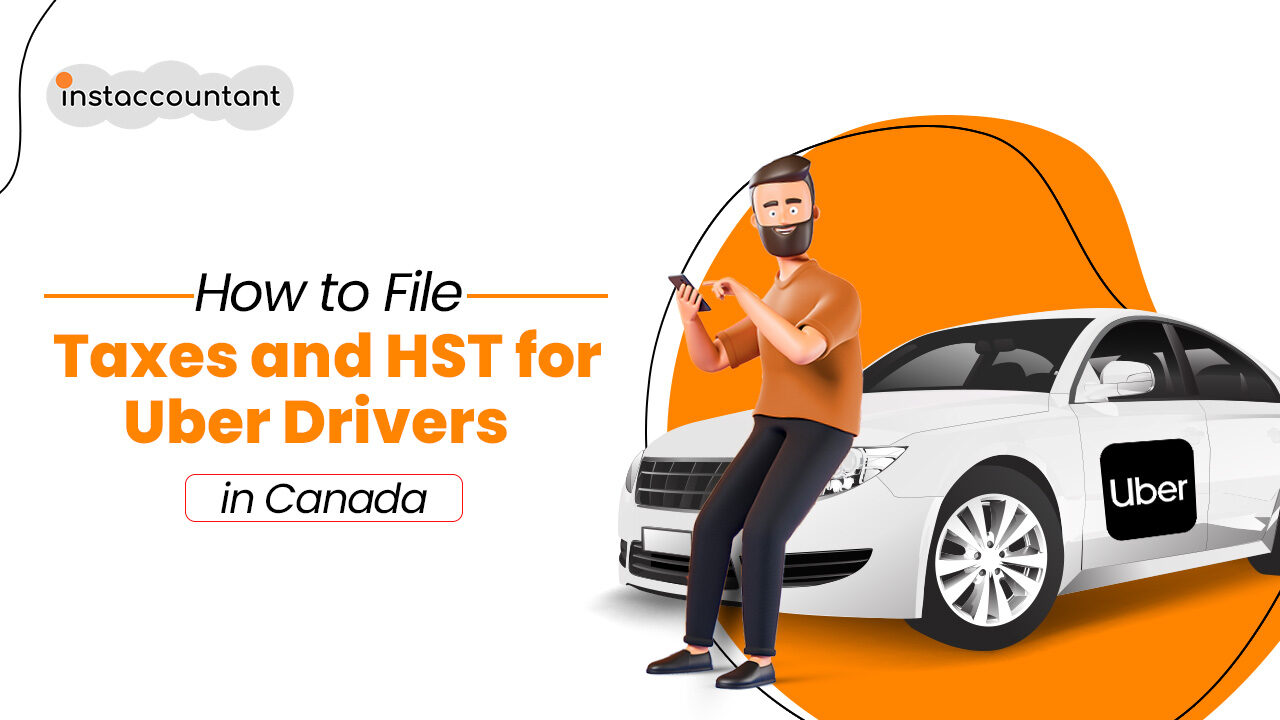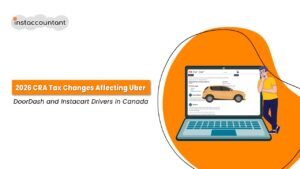Starting a career as a ride-share driver in Canada, whether with Uber, Lyft, or any other ride-sharing app, can be both rewarding and challenging. However, you also need to be aware of the tax implications of being a ride-share driver. Unlike regular employees, you are considered self-employed and have to report your income and expenses accordingly. In this comprehensive guide, we’ll break down everything you need to know about filing taxes as an Uber driver in Canada.

Employment Income vs. Self-employment Income
If you work for an employer, you earn employment income. Your employer pays you a salary or wages, and takes off income tax, CPP, EI, and other amounts from your paycheque. You get a T4 slip at the end of the year that shows your income and deductions. You need this slip to do your taxes and claim any credits or deductions you qualify for.
If you run your own business or sell your own services, you earn self-employment income. You have to collect payments from your customers or clients, and pay your own income tax, CPP, EI, and other taxes. You also have to record your business income and expenses, and report them on your tax return. You can deduct business expenses that are reasonable and related to your business activities, which can lower your taxable income.
Uber Driver Income Tax and HST Obligations
If you drive for Uber in Canada, you are considered self-employed and need to pay income tax to the Canada Revenue Agency (CRA). You have to keep track of your earnings and expenses and report them on your tax return. Uber does not deduct any taxes from your payments; they only charge you service fees and transfer the rest to your bank account. You can lower your taxable income by claiming business expenses related to your Uber business.
Another important tax implication for Uber drivers in Canada is HST. You have to charge and remit HST on all your ride-sharing fares, no matter how much you earn. For example, in Ontario, HST applies to all ride-sharing services. You have to get an HST number and file HST returns on a regular basis. You have to comply with the sales tax rules of your province and understand your HST obligations as an Uber driver.
Uber Driver Income and Work Related Expenses
If you are an Uber driver, you need to keep track of your income and expenses for tax purposes. This will help you maximize your deductions, avoid mistakes, and stay out of trouble with the CRA. Here are some tips on how to do it effectively.
- Record all your income from the Uber app, as well as any cash or tips you get from customers.
- Record all your expenses related to your ride share business, such as fuel, car repairs, insurance, phone bills, parking fees, tolls, etc. Keep receipts or invoices for everything.
- Use a tool like Zoombooks (a app made for self-employed people and drivers) or a spreadsheet or software program to organize your income and expenses by date and category. Check your records against your bank statements and credit card statements to make sure they match.
- Review your records regularly and make sure they are accurate and complete.
- At the end of the year, use Form T2125 – Statement of Business or Professional Activities to report your income and expenses on your tax return. This will show your net income or loss from your ride share business, which will affect your overall tax liability.
Tax Deductions for Rideshare (Uber and Lyft) Drivers
As an Uber driver, you can reduce your tax liability by claiming various expenses that are related to your rideshare business. These expenses include:
- Car expenses: You can deduct the cost of gas, maintenance, repairs, insurance, registration, and depreciation of your vehicle. You can use either the standard mileage rate or the actual expense method to calculate your deduction.
- Uber fees: You can deduct the fees that Uber charges you for using their platform, such as the service fee, booking fee, and tolls.
- Other business expenses: You can deduct any other expenses that are necessary for your rideshare business, such as cell phone bills, parking fees, accounting fees, and licenses.
To claim these deductions, you need to keep accurate records and receipts of all your income and expenses. You also need to report them on T2125 form of your tax return.
Uber Driver Tax Deadlines and Filing Requirements
If you drive for Uber, you need to know the tax deadlines and filing requirements for self-employed individuals. You must report your self-employment income and expenses on Form T2125 when you file your income tax return. The deadline for filing your income tax return is usually April 30th, but you have an extra month until June 15th if you or your spouse or common-law partner is self-employed. However, you must pay any taxes you owe by April 30th to avoid interest and penalties.
You also need to file your HST return and pay any HST you owe by the due date. The due date depends on your reporting period, which can be monthly, quarterly, or annually. The due date is usually one month after the end of your reporting period.
Tips for Filing Your Tax Return as an Canadian Uber Driver
As a ride share driver, you need to know how to file your taxes correctly and efficiently. Here are some useful tips to help you with your tax preparation:
- Don’t miss the tax deadline: The due date for your self-employed tax return is June 15th of the next year, but if you owe any taxes, you have to pay them by April 30th. Otherwise, you will face penalties and interest charges from the CRA. To avoid this, file your taxes as soon as possible and pay what you owe on time.
- Deduct your eligible Uber expenses: You can reduce your taxable income by claiming all the expenses that are related to your ride share business. These include vehicle costs (such as gas, maintenance, depreciation, insurance, etc.), phone costs (such as data plan, charger, mount, etc.), parking fees, tolls, licenses, memberships, etc. You have two options to claim your vehicle expenses: you can either use the actual expenses method based on your receipts and records, or you can use the simplified method based on a standard mileage rate (currently 68 cents per kilometer for 2023). However, you can only deduct the portion of these expenses that corresponds to the percentage of kilometers you drove for business purposes versus personal purposes.
- Report income from all sources: You have to report all the income you earned from your Uber app, including tips and cash payments. Your ride share app should provide you with a tax summary or statement that shows your total earnings and fees for the year. You also have to report any other income you earned from other sources (such as employment income) on your tax return.
- Register for HST/GST: You are required to collect and remit the sales tax within 30 days of providing the very first trip to your customers. You have to charge HST/GST on your fares, and remit it to the CRA on a regular basis (either monthly, quarterly, or annually). You can also claim input tax credits for the HST/GST you paid on your business expenses
- Get professional help if needed: If you are not confident about filing your taxes as a ride share Uber driver, or if you have a complicated tax situation, you may want to seek the advice of a professional accountant or tax preparer. They can help you optimize your tax return and avoid any errors or audits.
These tips can help you file your taxes as a ride share driver and maximize your deductions.
Conclusion
To wrap up, being a ride-share driver in Canada can be a rewarding and lucrative side hustle, but it also requires careful tax planning and preparation. You don’t want to miss out on any deductions or credits that could lower your tax bill, or face penalties or audits for underreporting your income. That’s why it’s important to consult a tax professional who can help you navigate the complex rules and regulations of self-employment taxes. By following the best practices outlined in this blog post, you can make the most of your ride-share earnings and enjoy the perks of being your own boss. Good luck and enjoy your driving experience!




